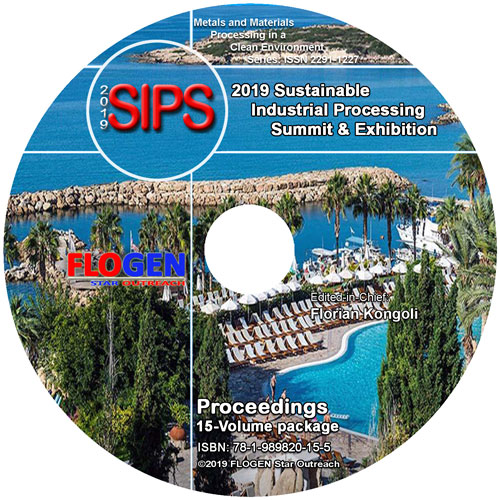2019-Sustainable Industrial Processing Summit
SIPS2019 Volume 4: Kozlov Intl. Symp. / Sustainable Materials Recycling Processes and Products
| Editors: | F. Kongoli, S.V. Alexandrovich, D.V. Grigorievich, L.L. Igoryevich, I. Startsev, T.A. Vladimirovich |
| Publisher: | Flogen Star OUTREACH |
| Publication date: | 20 December 2019 |
| Pages: | 193 pages |
| ISBN: | 978-1-989820-03-2 |
| ISSN: | 2291-1227 (Metals and Materials Processing in a Clean Environment Series) |

CD shopping page
Electrolytic Lead Obtaining from Secondary Materials
Pavel Arkhipov1; Yuriy Zaikov1; Yuliya Khalimullina1; Anna Kholkina2; Alexei Potapov3;1INSTITUTE OF HIGH TEMPERATURE ELECTROCHEMISTRY OF THE URAL BRANCH OF THE RUSSIAN ACADEMY OF SCIENCES, Ekaterinburg, Russian Federation; 2INSTITUTE OF HIGH-TEMPERATURE ELECTROCHEMISTRY, RUSSIAN ACADEMY OF SCIENCES, URAL DIVISION, Ekaterinburg, Russian Federation; 3INSTITUTE OF HIGH TEMPERATURE ELECTROCHEMISTRY, Ekaterinburg, Russian Federation;
Type of Paper: Regular
Id Paper: 320
Topic: 7
Abstract:
Lead is one of the metals that are included into the material production area multiple times because its losses during industrial operations are minimal. That is why the fraction of secondary lead in overall lead production is high. The secondary lead production in the world amounted 55.8 % of the overall amount of produced metal [1, 2].Development of the nuclear industry requires an increased amount of production of pure lead and Pb-Bi alloys of desired composition to be used as liquid metal heat carriers [3]. To obtain pure metallic lead from secondary materials, the method of electrochemical reduction of metallic lead from chloride melts was used [4]. The equilibrium potentials of the pseudo-binary liquid metal Pb-SbBi system was measured in the KCl-PbCl melt in the temperature region of 723–893 K. The thermodynamic characteristics of the Pb-SbBiij system in the liquid state were calculated [5]. To develop the technology of the electrolytic lead obtained in molten chloride systems, it is important to understand the mechanism of the processes that take place in the liquid metal electrodes. There is a lack of information on the liquid metal electrode solubility in the Bi-Sb-Pb alloys in the KCl-PbCl melt. The anode dissolution of alloys was studied by the current cut-off from the stationary conditions in the galvanostatic regime using a galvanostate–potentiostate IPC-Pro. The influence of the liquid metal bismuth-antimony-lead systems on the anode polarization in the molten lead and potassium chloride mixtures is established. According to the form of the concentration dependence of polarization curves, we assumed that the anode process in the liquid metal alloys in the KCl-PbCl2 (50-50 mol. %) melt has a diffusion character. The parameters of electrochemical lead obtained from secondary materials were determined.
Keywords:
Alloy; Lead; MoltenSalts; Recycling; Refining; Wastes;References:
[1] Goncharov G.V. (Metal Research). Russian market of non-ferrous metals: yesterday, today, tomorrow // Non-ferrous Metallurgy. 2014. â„– 5. pp 32-36 (in Russian).[2] Morachevskiy, A.G. Worked out lead batteries as the most important source of secondary lead // Metallurgy. 2014. â„– 4(207). p.127 (in Russian).
[3] S.K.Sahu, R.Ganesan, T.Gnanasekaran, 2012. Journal Nuclear Materials, Volume 426, pp. 214-222.
[4] P.Arhipov, Yu.Zaykov, Yu.Khalimullina, A.Kholkina Electrolytic refining of lead in molten chloride electrolytes. International Journal of Technology. 2017. P. 572-581.
[5] P. A. Arkhipov, A. S. Kholkina, and Yu. P. Zaykov, “EMF Measurements in the Liquid Pb/PbCl2-KCl/Pb-Sb-Bi System,†J. Electrochem. Soc., 163(2), H30 (2016).